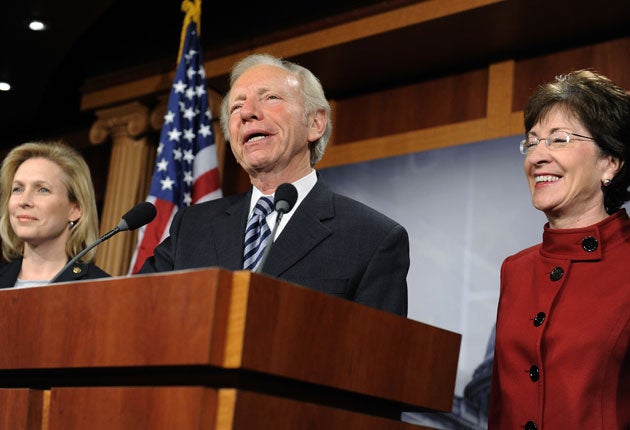Joy as 'Don't ask, don't tell' policy repealed
After 17 years and 14,000 expulsions, US Senate finally rejects controversial ruling

The barriers to gays and lesbians openly serving in the US military were swept away at the weekend after the Senate voted by a convincing margin to repeal the deeply controversial "don't ask, don't tell" policy put in place by former president Bill Clinton 17 years ago.
The repeal, passed late on Saturday with support from eight Republican senators, was hailed by its supporters as the most important US civil rights achievement in decades, as important as the military's decision to end racial segregation in the 1950s and open its academies to women in the 1970s.
"This is the defining civil rights initiative of this decade," said Aubrey Sarvis, executive director of the Service members Legal Defense Network. "Congress has taken an extraordinary step on behalf of men and women who've been denied their rightful integrity for too long."
In an email message of thanks to those advocates of the Bill repealing the ban, President Barack Obama pledged to sign it into law promptly. "I will never know what it feels like to be discriminated against because of my sexual orientation," he acknowledged.
The vote is an important step forward for the gay and lesbian movement though the fact that it was such a long time coming may not bode well for the other priorities on their agenda, like gay marriage.
The 65-31 vote spurred supporters of repeal to cheer and hug one another in the public gallery, aware that crushing disappointment had only been narrowly averted. Just days before, it had seemed that the Democrat-led drive to repeal the ban was doomed to failure and that its prospects for passage would only dim further with Republicans taking control of the lower chamber in January.
"We righted a wrong," declared Senator Joseph Lieberman, the former vice-presidential candidate who had spearheaded the push to pass the Bill in the Senate. "Today we've done justice." He said about 14,000 men and women had been expelled from the US military under the existing policy.
Senator Ron Wyden, a Democrat from Oregon, said as the debate opened: "I don't care who you love. If you love this country enough to risk your life for it, you shouldn't have to hide who you are."
Introduced in 1993 at the start of the first Clinton administration, the "don't ask, don't tell" approach was meant as an improvement on the existing comprehensive ban on gays serving in the military. But civil rights advocates saw it as a form of government-sanctioned discrimination. It also put the US out of step with most of its allies, Britain included, which moved on from the issue long ago.
Opponents of the change included Senator John McCain, the former Republican presidential candidate and Vietnam veteran, who on other issues stands out as a party moderate. "I hope that when we pass this legislation that we will understand that we are doing great damage," he said.
Ending the policy was a key campaign pledge of President Obama and the delays and hiccups that preceded the weekend vote had infuriated the progressive wing of his party. "It is time to close this chapter in our history," Mr Obama said in a statement. "It is time to recognise that sacrifice, valour and integrity are no more defined by sexual orientation than they are by race or gender, religion or creed."
But Robert Gates, the US Defence Secretary, and most of the US military's leadership had come round to supporting the change, in part because had Congress not acted to repeal it, the courts would almost certainly have forced them into it. On the orders of Mr Obama, the Commander-in-Chief, the Pentagon spent most of this year completing an exhaustive study on the likely impact of an end to the ban. The conclusions recently presented to Congress said it would be "minimal".
Mr Gates welcomed the Senate vote but warned that even after the signature of the Bill into law by the president it would be some weeks before the old restrictions were entirely lifted.
"I will approach this process deliberately and will make such certification only after careful consultation with the military service chiefs and our combatant commanders and when I am satisfied that those conditions have been met for all the services, commands and units," Mr Gates said.
Came out, thrown out
* One soldier for whom the repeal will have huge importance is Warren Arbury of Savannah, Georgia, a former army sergeant of seven years. Before he was kicked out of the US army in 2008, he served in Iraq as a nuclear and biological chemical specialist. He had kept his sexual orientation secret, but after a few months, decided to come out. "I made a decision that I was going to be honest with the people I worked with and I don't really think they were that surprised," he told the US television channel WTOC. This was however not what got him discharged, but rather a fellow soldier and former lover in legal trouble who told on him. He will re-enlist once the policy is abolished.
Bård Aune
Subscribe to Independent Premium to bookmark this article
Want to bookmark your favourite articles and stories to read or reference later? Start your Independent Premium subscription today.

Join our commenting forum
Join thought-provoking conversations, follow other Independent readers and see their replies